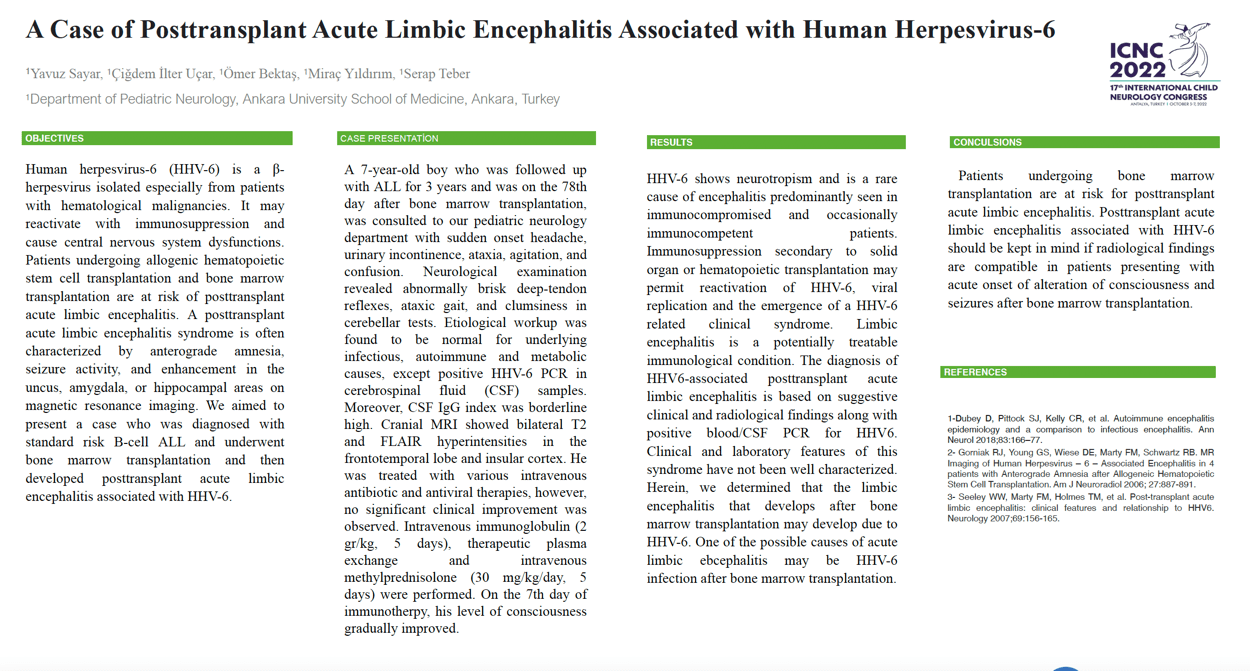A case of posttransplant acute limbic encephalitis associated with human herpesvirus-6
Yavuz Sayar, Çiğdem İlter Uçar, Ömer B
ektaş, Miraç Yıldırım, SerapObjectives: Posttransplant acute limbic encephalitis is a rare nonparaneoplastic limbic encephalitis, characterized by headache, seizures, and alteration of consciousness. We aimed to present a case who was diagnosed with standard risk B-cell ALL and underwent bone marrow transplantation and then developed posttransplant acute limbic encephalitis due to human herpesvirus-6 (HHV-6). Case Presentation: A 7-year-old boy who was followed up with ALL for 3 years and was on the 78th day after bone marrow transplantation, was consulted to the pediatric neurology department with sudden onset headache, urinary incontinence, ataxia, agitation, and confusion. Neurological examination revealed abnormally brisk deep-tendon reflexes, ataxic gait, and clumsiness in cerebellar tests. Etiological workup was found to be normal for underlying infectious, autoimmune and metabolic causes, except positive HHV-6 PCR in cerebrospinal fluid (CSF) samples. Moreover, CSF IgG index was borderline high. Cranial MRI showed bilateral T2 and FLAIR hyperintensities in the frontotemporal lobe and insular cortex. He was treated with various intravenous antibiotic and antiviral therapies; however, no significant clinical improvement was observed. Intravenous immunoglobulin (2 gr/kg, 5 days), therapeutic plasma exchange and intravenous methylprednisolone (30 mg/kg/day, 5 days) were performed. On the 7th day of treatment, his level of consciousness gradually improved. Conclusion: Patients undergoing bone marrow transplantation are at risk for posttransplant acute limbic encephalitis. Posttransplant acute limbic encephalitis associated with HHV-6 should be kept in mind if radiological findings are compatible in patients presenting with acute onset of alteration of consciousness and seizures after bone marrow transplantation.
Keywords: Limbic encephalitis, Human herpesvirus-6, methylprednisolone, posttransplant
Yavuz Sayar
Ankara University School of Medicine
Turkey
Çiğdem İlter Uçar
Ankara University School of Medicine
Turkey
Ömer Bektaş
Ankara University School of Medicine
Turkey
Miraç Yıldırım
Ankara University School of Medicine
Turkey
Serap Teber
Ankara University School of Medicine
Turkey Teber
ektaş, Miraç Yıldırım, SerapObjectives: Posttransplant acute limbic encephalitis is a rare nonparaneoplastic limbic encephalitis, characterized by headache, seizures, and alteration of consciousness. We aimed to present a case who was diagnosed with standard risk B-cell ALL and underwent bone marrow transplantation and then developed posttransplant acute limbic encephalitis due to human herpesvirus-6 (HHV-6). Case Presentation: A 7-year-old boy who was followed up with ALL for 3 years and was on the 78th day after bone marrow transplantation, was consulted to the pediatric neurology department with sudden onset headache, urinary incontinence, ataxia, agitation, and confusion. Neurological examination revealed abnormally brisk deep-tendon reflexes, ataxic gait, and clumsiness in cerebellar tests. Etiological workup was found to be normal for underlying infectious, autoimmune and metabolic causes, except positive HHV-6 PCR in cerebrospinal fluid (CSF) samples. Moreover, CSF IgG index was borderline high. Cranial MRI showed bilateral T2 and FLAIR hyperintensities in the frontotemporal lobe and insular cortex. He was treated with various intravenous antibiotic and antiviral therapies; however, no significant clinical improvement was observed. Intravenous immunoglobulin (2 gr/kg, 5 days), therapeutic plasma exchange and intravenous methylprednisolone (30 mg/kg/day, 5 days) were performed. On the 7th day of treatment, his level of consciousness gradually improved. Conclusion: Patients undergoing bone marrow transplantation are at risk for posttransplant acute limbic encephalitis. Posttransplant acute limbic encephalitis associated with HHV-6 should be kept in mind if radiological findings are compatible in patients presenting with acute onset of alteration of consciousness and seizures after bone marrow transplantation.
Keywords: Limbic encephalitis, Human herpesvirus-6, methylprednisolone, posttransplant
Yavuz Sayar
Ankara University School of Medicine
Turkey
Çiğdem İlter Uçar
Ankara University School of Medicine
Turkey
Ömer Bektaş
Ankara University School of Medicine
Turkey
Miraç Yıldırım
Ankara University School of Medicine
Turkey
Serap Teber
Ankara University School of Medicine
Turkey Teber

Yavuz Sayar
Ankara University School of Medicine Turkey
Ankara University School of Medicine Turkey